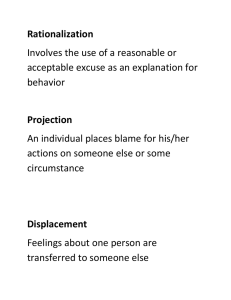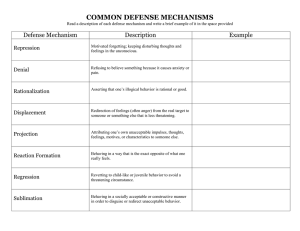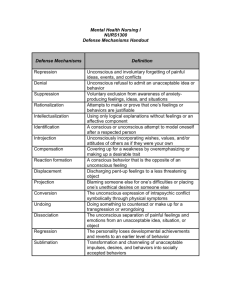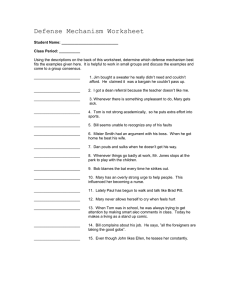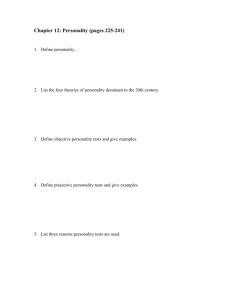Defense Mechanisms Worksheet: Psychology Practice
advertisement
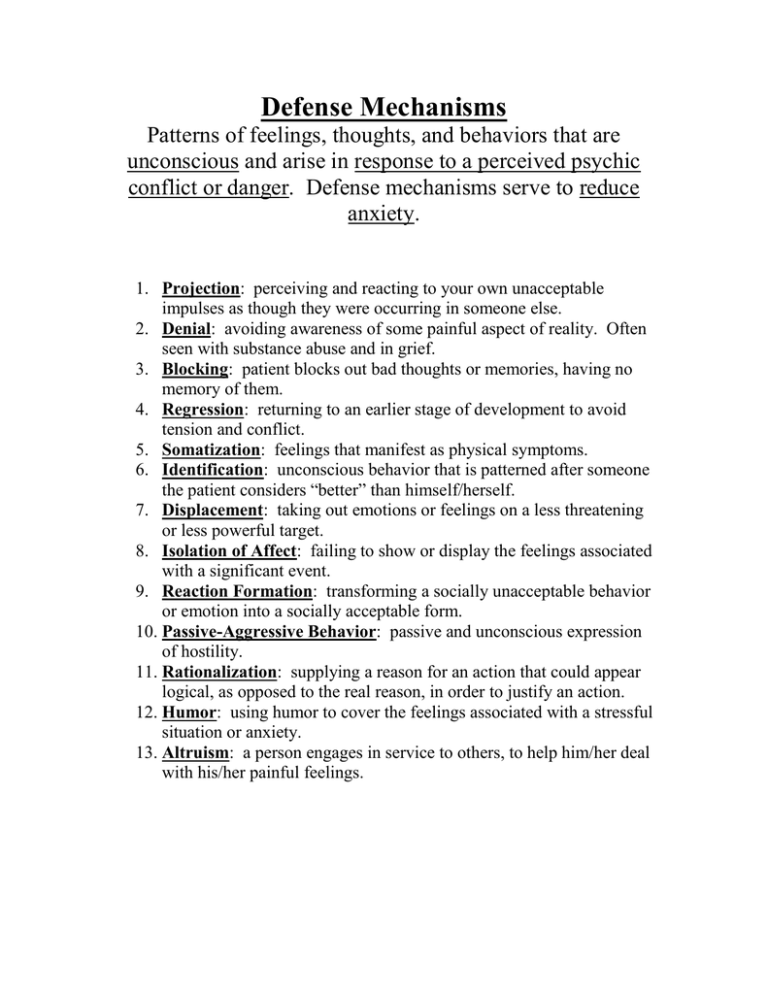
Defense Mechanisms Patterns of feelings, thoughts, and behaviors that are unconscious and arise in response to a perceived psychic conflict or danger. Defense mechanisms serve to reduce anxiety. 1. Projection: perceiving and reacting to your own unacceptable impulses as though they were occurring in someone else. 2. Denial: avoiding awareness of some painful aspect of reality. Often seen with substance abuse and in grief. 3. Blocking: patient blocks out bad thoughts or memories, having no memory of them. 4. Regression: returning to an earlier stage of development to avoid tension and conflict. 5. Somatization: feelings that manifest as physical symptoms. 6. Identification: unconscious behavior that is patterned after someone the patient considers “better” than himself/herself. 7. Displacement: taking out emotions or feelings on a less threatening or less powerful target. 8. Isolation of Affect: failing to show or display the feelings associated with a significant event. 9. Reaction Formation: transforming a socially unacceptable behavior or emotion into a socially acceptable form. 10. Passive-Aggressive Behavior: passive and unconscious expression of hostility. 11. Rationalization: supplying a reason for an action that could appear logical, as opposed to the real reason, in order to justify an action. 12. Humor: using humor to cover the feelings associated with a stressful situation or anxiety. 13. Altruism: a person engages in service to others, to help him/her deal with his/her painful feelings. Identify the type of defense mechanism used by each patient description below: a) A student who fails to do his work, claims her poor grades are due to the fact that the teacher does not like her. ______________ b) A patient who states: “the tests may show that I have cancer, but they are wrong. _______________ c) A husband who never appears angry with his spouse, but is repeatedly late to her important events and occasions. _______________ d) A boy accuses his girlfriend of cheating on him, when in fact he is secretly attracted to his girlfriend’s best friend. _______________ e) A child raised by a domineering and strict father becomes a drill sergeant in the marines. _______________ f) A woman who fails to remember any details of her being raped as a teenager. _______________ g) An elderly man who was tortured as a POW in World War II, talks about the event in an even, mono-tone voice, without emotion. _______________ h) A patient tells the ER doctor to stitch a tic-tac-toe board design on his abdomen, after being stabbed during a robbery. ________________ i) A woman going through a divorce develops daily headaches and fatigue. ____________ j) A six year-old child begins talking like a baby, following the birth of his baby brother. _______________ k) A man who was yelled at at work by his boss, comes home and yells at his wife and children for no apparent reason. _______________ l) A man who enjoys setting fires, decides to become a fireman. _______________ m) A woman who lost her leg in an accident, volunteers at a camp for children with physical disabilities. _______________ Answers to Defense Mechanism questions: a) Rationalization b) Denial c) Passive-Aggressive d) Projection e) Identification f) Blocking g) Isolation of Affect h) Humor i) Somatization j) Regression k) Displacement l) Reaction Formation m) Altruism

